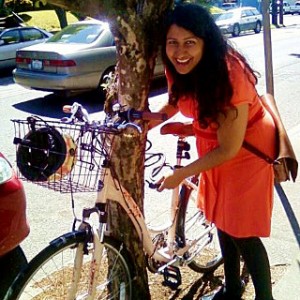Please join us in welcoming a new regular contributor to the site: Taz Loomans. Taz, a Portlander whose writing you may have seen on Atlantic Cities, Inhabitat or her own site BloomingRock.com, will be taking the delicious title of BikePortland’s subversiveness columnist. She’ll be approaching that from many angles, but we suggested she start things rolling with a bit about herself.
__
The world didn’t want me to bike. Biking was for men, for recreation, or for poor people, but definitely not a mode of transportation for a woman.
That is the message I got from my parents when I started to ride my bike in Phoenix. My dad was born and raised in Tanzania and my mom was raised in Mozambique. We are Muslim Indians by origin. Both my parents come from places where only poor people bike, and even then, women aren’t among them.
Riding a bike became about more than just subverting the way modern life in my city was designed around cars, it also became about transcending some of the ethnic cultural taboos I grew up with.
I started riding a bike for transportation for a lot of the same reasons other people ride, for the environment and to get exercise. As an architect, I was also fascinated with the way I experienced the city in a different way than I did using a car. Plus, I thought that commuting by bike was cool and it held an air of freedom that seemed appealing. I suppose it was freedom from the norm around me in Phoenix, which was living out in the burbs and sitting in traffic for hours.
But riding a bike became about more than just subverting the way modern life in my city was designed around cars, it also became about transcending some of the ethnic cultural taboos I grew up with.
When I looked into the taboo of women riding bikes in some cultures, I found that bike riding was completely banned in Saudi Arabia for women until recently, when women were allowed to ride in restricted recreation areas — and only for entertainment,not for transportation. It is funny, because that was one of the point my parents raised: bike riding seems OK for fun, but not to get around.
So I looked into it some more and found out that the taboo of women riding bikes exists in parts of Iran and Turkey as well, where conservative religious scholars are espousing a different kind of bike technology that would make it more onerous for women to ride a bike. They are looking to build the “Islamic bicycle,” which comes with a boxy contraption designed to hide the lower part of a woman’s body.
Advertisement
Women are allowed to bike for transportation in Iran, but they are required to dress modestly, which entails strict dress codes that include not showing any part of your body except your face, hands and feet. This makes women nervous to ride, as it is almost impossible to ensure that some part of your body won’t become exposed due to a possible breeze.
Every time I get on my bicycle, there is an extra part of me that exults.
In Pakistan, women who straddle a bicycle or motorcycle seat are shamed as morally-loose women and are culturally discouraged from riding these vehicles, unless they are passengers in the back with both legs off to one side. And the few brave women who ride bikes in Afghanistan are routinely harassed by men passing by and are told that they are bringing shame to their families. Recently, a group of Afghani women formed the Women’s National Cycling Team of Afghanistan aiming to participate in the 2020 Olympics. They have garnered both ridicule and actual threats to their lives and intense admiration among some Afghanis and people around the world.
My family has lived in the United States for over 30 years now, which is almost all of my life. And it is true that the extreme restrictions and taboo against women riding bikes in other countries has only showed up as a minor protest from my mom and dad, who were, though disappointed in my choice, not vehemently against me riding a bike for transportation. After five years of my doing so, my parents have come to accept this part of who I am and have come to understand that there is nothing untoward for a woman to ride a bicycle for transportation.
And every time I get on my bicycle, there is an extra part of me that exults at knowing that I am eschewing traditional views about women doing something physical and “sporty” that is usually relegated to men, even though I live in a country where this is nothing remarkable.
Taz Loomans is an architect and a writer who lives in Portland. Check out her blog at BloomingRock.com and stay tuned for her next installment here on BikePortland.



